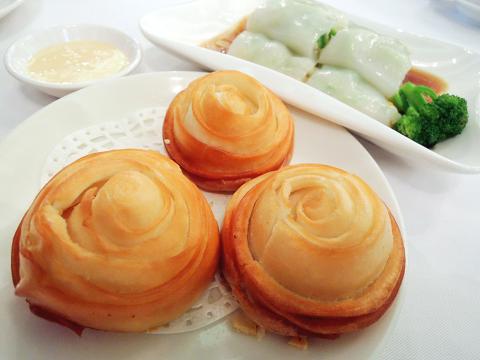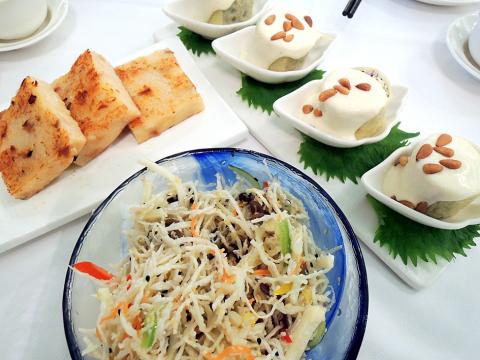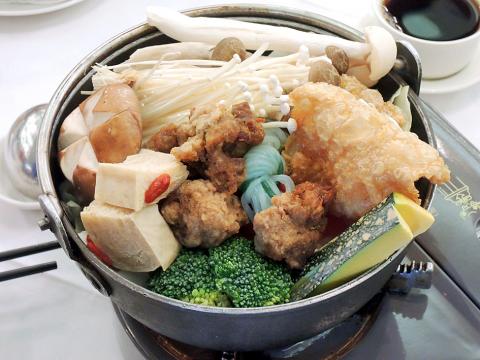Established in 2013, Yang Shin Vegetarian Restaurant is the first vegetarian dim sum restaurant in Taipei. The name Yang Shin means “cultivating one’s heart.” With head chef Chan Sheng-lin’s (詹昇霖) excellent cooking skills and non-stop creativity, it has quickly gained popularity and was lauded last year as one of the top 10 vegetarian restaurants in Taiwan by DailyView Online Thermometer (網路溫度計), a “big data” research group.
Located next to Songjiang Nanjing MRT Station (松江南京站), Exit 8, the restaurant is on the second floor above Nozomi Bakery, which is also operated by the Yang Shin Group. Since business is always good, reservations are recommended. The overall environment is clean and cozy, and the waitstaff are polite and efficient. There is an exquisite semi-open kitchen decorated with cultured stone on one side of the hall, where chefs prepare dim sum behind a glass window.
For appetizers, the popular pine nuts and vegetable cheese rolls (松子起司鮮蔬卷, NT$180) are a pleasant surprise, featuring shredded cabbage and chopped blueberries wrapped in dried laver and egg rolls garnished with perilla leaves. The pine nuts and sauce consisting of cheese, mayonnaise and quat jam are an ideal accompaniment to the veggie rolls. The mixed salad of areca flowers and bell peppers (五彩涼拌檳榔花, NT$180) is light and fresh. The flowers’ texture is similar to that of bamboo shoots, and they are mixed harmoniously with the colorful sweet peppers and sesame.

Photo: Eddy Chang, Taipei Times
Yang Shin takes pride in its creative and mouthwatering dim sum, offering over 30 varieties priced between NT$68 and NT$128. And if customers use Facebook to “check in” to the restaurant, they can receive an order of “deep-fried spring rolls” (蟲草香芹炸春卷, NT$128) for free.
The crispy deep-fried pastries with shredded turnip (蘿蔔絲酥餅, NT$108) came to our table already sliced in half — somewhat of a disappointment for those of us who prefer the robust taste of the turnip juice inside the pastries and not on the plate. Still, they were tasty.
All the dim sum that we tried tasted as good as it looked. We had baked cheese cabbage (芝士焗白菜, NT$128), Cantonese BBQ veggie ham pastries (鬆化叉燒酥, NT$108), deep-fried wontons with basil and vegetables (塔香金雲吞, NT$108), steamed rice noodle rolls with loofah and lily bulbs (絲瓜百合腸, NT$98), pan-fried turnip cakes (香煎蘿蔔糕, NT$68) and deep-fried spiral buns (炸螺絲卷, NT$68).

Photo: Eddy Chang, Taipei Times
Instead of using pork, the 48-layer BBQ pastries are stuffed with veggie ham, tomato and minced mushroom in a sweet and savory vegetarian oyster sauce. The spiral buns, which are crispy on the outside and tender on the inside, go well with the sweetened condensed milk dip. The buns were so delicious that we ordered them twice.
The restaurant also has an extensive menu offering over 80 meatless dishes, such as the popular stir-fried crispy mushrooms and green beans (柳松乾煸四季豆, NT$280) and sauteed edible burdock root on rice (養心牛蒡飯, NT$30). And finally, Chinese herbal hot pot (養身藥膳鍋, NT$380) is a perfect ending for this vegetarian adventure. The pot is filled with tofu, vegetables and mushrooms. Cooked with ginseng, angelica, Chinese red dates and wolfberries, the soup does not have too strong a Chinese herbal flavor and is healthy. Refills are unlimited.
The restaurant offers combo sets priced between NT$8,800 and NT$12,800 for 10 guests. But for afternoon tea, only dim sum items are available. Each guest also needs to pay NT$40 for tea. The big dinner of five people cost NT$2,204. Overall, Yang Shin was an exciting veggie experience. So if you like sophisticated vegetarian cuisine, this is the right place to go.

Photo: Eddy Chang, Taipei Times

No one saw it coming. Everyone — including the Chinese Nationalist Party (KMT) — expected at least some of the recall campaigns against 24 of its lawmakers and Hsinchu Mayor Ann Kao (高虹安) to succeed. Underground gamblers reportedly expected between five and eight lawmakers to lose their jobs. All of this analysis made sense, but contained a fatal flaw. The record of the recall campaigns, the collapse of the KMT-led recalls, and polling data all pointed to enthusiastic high turnout in support of the recall campaigns, and that those against the recalls were unenthusiastic and far less likely to vote. That

Behind a car repair business on a nondescript Thai street are the cherished pets of a rising TikTok animal influencer: two lions and a 200-kilogram lion-tiger hybrid called “Big George.” Lion ownership is legal in Thailand, and Tharnuwarht Plengkemratch is an enthusiastic advocate, posting updates on his feline companions to nearly three million followers. “They’re playful and affectionate, just like dogs or cats,” he said from inside their cage complex at his home in the northern city of Chiang Mai. Thailand’s captive lion population has exploded in recent years, with nearly 500 registered in zoos, breeding farms, petting cafes and homes. Experts warn the

A couple of weeks ago the parties aligned with the People’s Republic of China (PRC), the Chinese Nationalist Party (KMT) and the Taiwan People’s Party (TPP), voted in the legislature to eliminate the subsidy that enables Taiwan Power Co (Taipower) to keep up with its burgeoning debt, and instead pay for universal cash handouts worth NT$10,000. The subsidy would have been NT$100 billion, while the cash handout had a budget of NT$235 billion. The bill mandates that the cash payments must be completed by Oct. 31 of this year. The changes were part of the overall NT$545 billion budget approved

Before performing last Friday at Asia’s bellwether music festival, Fuji Rock in Japan, the Taiwanese indie band Sunset Rollercoaster (落日飛車) had previously performed on one of the festival’s smaller stages and also at Coachella, the biggest brand name in US music festivals. But this set on Fuji Rock’s main stage was a true raising of the bar. On a brilliant summer’s evening, with the sun rays streaming down over a backdrop of green mountains and fluffy white clouds, the performance saw the Taiwanese groovemasters team up with South Korean group Hyukoh, with whom they’ve formed a temporary supergroup called AAA